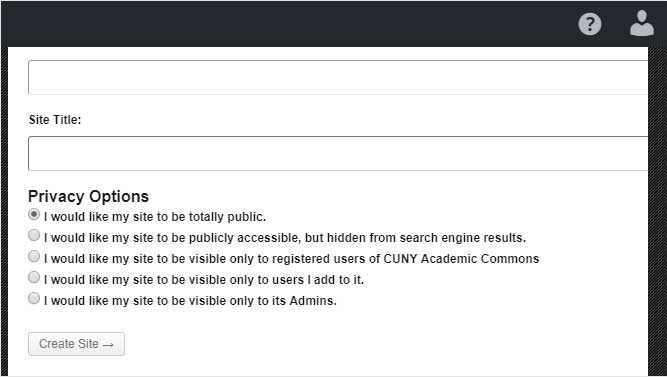Fear of going “Totally Public”: Course Sites and Student Privacy
Welcome back to another week at the In Common blog,
Last Spring, the Commons team began encouraging faculty to use the Commons in their undergraduate courses as an alternative to proprietary platforms such as Blackboard, WordPress.com, or Canvas (you can read reflections from faculty who were early adopters here, compiled by the GC’s Teaching and Learning Center). In the upcoming updates to the Commons, the process of inviting users to a group will be made significantly easier in an effort to make teaching on the Commons easier.
This new initiative raises an important question: what privacy settings should you use on your course blog? Should you tread, boldly, into the world of being “totally public”?
In this week’s post, I want to make a brief case for doing so and I invite readers to post their thoughts in response. Do you use open courses? How? Why is it important to your pedagogy?

In a sense, the most significant difference between the Commons and proprietary software like Blackboard is that course work can be open to the public. Blackboard places not only student work but course materials behind a wall that limits accessibility. One of the guiding principles behind the Commons is that intellectual work is a public good that only benefits people when it is shared openly. Making a course “totally public” makes course material open to your students of course, but also students and educators all over the world. Additionally, it inaugurates students into a world where they are contributors to public knowledge rather than just consumers of it.
Volumes of ink have spilled describing the benefits of demonstrating to students that their school work has a potential audience outside the classroom. Instructors have used social media to have students engage with scholars through Twitter and Facebook, and they’ve invited colleagues and collaborators to respond to student comments and coursework. These hint at some of the enlightening experiences students can have when their work is made public. Public blogs also encourage students to collect useful outside materials in one place and share them, demonstrating the fact that students are already making use of other publicly available knowledge and ultimately helping out their classmates.
But what responsibility do instructors have to the privacy of their students? FERPA demands that student work not be made public without the written authorization of students. How should that affect the decision of instructors to make their blogs public?
The GC’s HASTAC has a useful post that addresses these issues succinctly, with recommendations from Kevin Smith, Duke University’s Director of Copyright and Scholarly Communication. In short, Smith argues that public blogs present no conflict with FERPA provided you follow these simple recommendations:
- Inform students at the beginning of the course that they will be required to post to a public blog and give them the opportunity to speak with you privately if they have any concerns about their privacy when doing so.
- Make it possible for students to participate in the blog under an alias or pseudonym. Most advice actually says that students should be encouraged to use pseudonyms.
- Strongly remind students not to post private information.
- Consider whether you should provide an alternative way for a student to fulfill the class requirements if they are really concerned about participating in a public blog, even under an alias. Most students will think this is a perfectly fine, natural activity. But FERPA is in place to protect the rare, unfortunate student who may need to hide from a stalker or abuser. In those situations, fear may be a strong motivator for the student, and that apprehension should be taken seriously.
Having made my case briefly, I invite readers to comment below. What struggles have you had making courses open or what success stories have you had? What resources have you found helpful?
That’s it for this week,
Paul



Great stuff here Paul. Im a big promoter of transparency and making all of my courses and course work public. After 10 years of doing this and testing various methods online, I have never had a student once mention to me that they did not want to participate. A clear explanation at the beginning of the course certainly helps guide the “why”, especially when we are discussing how the content could help many others literally around the world. I have only seen good come out of this.
I am very much interested in more on this topic, and will continue to play a role in the experimentation of public course blogs / websites in a few new ways this semester as well.